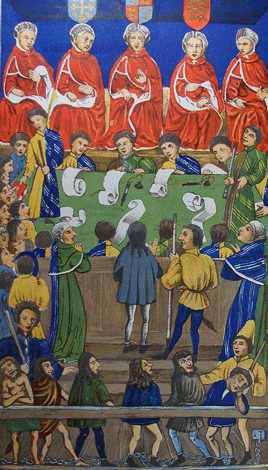Indictment
The course of further criminal proceedings would now depend upon whether the alleged crime was a mere "trespass" (a misdemeanour) or a felony punishable by death.
Since the 200 marks stolen by Falstaff would make his deed grand larceny*, prosecution would have to be carried out by means of an indictment, which required that a majority of at least 12 of Falstaff's peers* "present" against him as a grand jury*. A clerk drafted the indictment, listing evidence against the accused.
The prosecutor then read the bill before the grand jury and witnesses gave their testimony. After hearing the evidence*, the jurors would endorse the bill either as "true" or "ignoramus" (unfit for trial), in which case the accused would be released; otherwise he or she would stand trial.
Footnotes
-
Grand larceny
Theoretically, any theft of goods worth more than a shilling was considered grand larceny and felonious; but inflation made this definition meaningless. The courts were generally lenient unless dealing with a persistent offender or vagrant, when it was also less likely anyone would speak in his or her defence.
-
Well, almost peers . . .
Actually, the jury was composed of substantial freeholders sworn to debate a list of crimes committed in their county; they were not necessarily of equal status with the accused.
-
The oath of the grand jury
The need for an indictment prevented people from being tried for a capital offence merely on the accusation of an individual (even by the King or his ministers).
The Grand Jurors were required to swear an oath:
You shall diligently inquire and true presentment make of all such matters and things as shall be given you in charge. The king's counsel, your fellows', and your own, you shall well and truly observe and keep secret. You shall present no man for envy, hatred, or malice; neither shall you leave any man unpresented for love, fear, favour, or affection, profit, lucre, gain, or any hope thereof; but in all things you shall present the truth, the whole truth, and nothing but the truth.
(Quoted in Cockburn, J.S. ed., Crime in England, 1550-1800, p. 33.) -
A fool for a client?
At this stage of the process, those accused were not allowed to be represented by legal counsel, on the principle that persons speaking on their own behalf would show by their manner as well as their words whether their conscience was clear of guilt.
